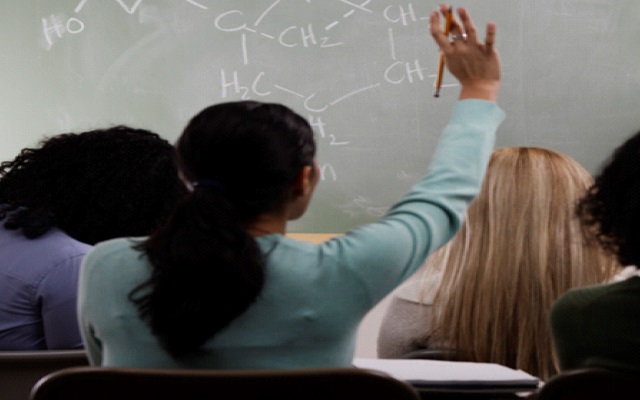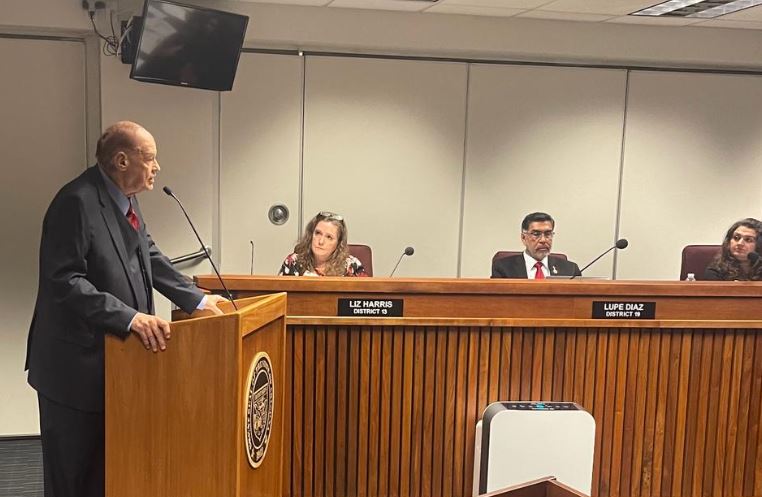
by Daniel Stefanski | Mar 28, 2023 | Education, News
By Daniel Stefanski |
Republicans are leading a historic effort to raise teachers’ salaries, while most Democrats are resisting the current approach in the Arizona State Legislature.
On Monday, the Arizona House moved HB 2800, sponsored by freshman Representative Matt Gress, closer to a final vote in the chamber, amending it in the Committee of the Whole session. This bill “mandates each school district and charter school increase the base salary of all eligible teachers as prescribed.” It also “creates the Pay Teachers First Fund and appropriates a total of $1,100,000,000 in FYs 2024 and 2025 to the Fund for required teacher salary increases.”
According to figures provided by House Republicans, HB 2800 would give Arizona teachers the fourth highest ($50,554) starting salaries in the nation, compared to a current ranking of 27th ($40,554).
Arizona Superintendent of Public Instruction Tom Horne previously announced his strong support of this bill and appeared at a press conference at the state capitol last week with Gress and other lawmakers to tout the legislation’s movement through the House.
When asked by AZ Free News about why he supported HB 2800, Superintendent Horne replied: “I support HB 2800 because no school is better than the quality of the teachers in the classroom. Our surrounding states pay more so we lose good teachers to them, and we can no longer afford to do that.”
Representative Gress thanked Superintendent Horne for his support of the bill, writing, “Thanks @RealTomHorne for your advocacy on #HB2800. Raising teacher pay is key to recruiting and retaining excellent talent. We will not be deterred by the unions who are actively pressuring House Democrats to kill a $10,000 pay raise for teachers.”
Gress submitted a floor amendment to his bill Monday, which passed. The changes, in part, “removes the stipulation that an eligible school may receive the prescribed per teacher base salary increases from the Pay Teachers First Fund only for the lesser of the number of eligible teachers that a) are employed by the school; or b) would be employed by the school if the school had 15 students per eligible teacher.” It also tweaked elements of the proposed school online transparency portal, school districts facilities master plans, and appropriations.
Though both Republicans and Democrats campaign on adequately funding public education in Arizona, Representative Gress’s proposal has met with fierce resistance from many Democrats and school & teacher organizations around the state. Five Democrats voted against the bill in the House Appropriations Committee, and representatives from the AZ School Administrators Association, AZ Education Association, Save Our Schools Arizona, and AZ School Boards Association have registered their opposition.
In the lead-up to Monday’s deliberations, the House Democrat Caucus ardently campaigned against HB 2800, calling it a “wolf in sheep’s clothing” and “deeply flawed.”
Should the bill pass the House, it will soon head to the Arizona Senate for consideration and a potential vote in that chamber in the near future. If it clears the Senate, Democrat Governor Katie Hobbs will be forced to decide between giving teachers a $10,000 raise or denying them this much-needed increase.
Daniel Stefanski is a reporter for AZ Free News. You can send him news tips using this link.

by Corinne Murdock | Mar 27, 2023 | Education, News
By Corinne Murdock |
Arizona State University (ASU) held a Department of Justice (DOJ) “United Against Hate” event for the LGBTQ+ community last Wednesday.
The event was the second in a series from the Arizona District Attorney’s Office, hosted by ASU’s Sandra Day O’Connor College of Law. There were approximately 80 guests invited, including representatives from the FBI, the Phoenix Police Department, the Maricopa County Attorney’s Office, and the Attorney General’s office.
District attorney Gary Restaino said that his office was not only committed to prosecuting hate crimes and discrimination, but tackling ignorance and bias.
“Hate crimes harm not just individuals, but also traumatize communities and families,” said Restaino. “My office is committed to using all the tools in our law enforcement arsenal, both to prosecute acts motivated by hate, and to educate against ignorance and bias.”
UAH events are part of the DOJ’s national United Against Hate program, which coordinates all 94 U.S. Attorney’s Offices (USAOs) to combat hate crimes. The DOJ announced the initiative last September. According to the initial press release description of the program, UAH events resemble workplace harassment training: hypothetical scenarios and video clips depicting real-life hate crime cases and stories.
Attorney General Merrick Garland explained that the UAH program was designed to strengthen coordination between the community and law enforcement to respond to hate crimes and discrimination.
“That is why the Justice Department has launched its new United Against Hate program. This initiative brings together community groups, community leaders, and law enforcement at every level to build trust and strengthen coordination to combat unlawful acts of hate,” said Garland.
Assistant Attorney General Kristen Clarke added that this greater coordination would ensure that more allegations of hate crimes and discrimination would be investigated.
“The stronger the ties between communities and law enforcement, the more faith that communities will have that their allegations will be investigated and taken seriously. This moment requires an all-hands-on-deck strategy to fully confront unlawful acts of hate,” said Clarke. “The United Against Hate program brings together the vast network of civil rights, government, faith, and community-based leaders needed to improve reporting, promote prevention strategies and build the resilience needed to confront hate crimes and incidents.”
Garland first revealed the intent to launch the UAH initiative in May 2021, following President Joe Biden signing the COVID-19 Hate Crimes Act and Jabara-Heyer NO HATE Act into law. The act prioritizes funding for states who implement a hate crimes investigatory infrastructure in accordance with the legislation, part of which includes a community liaison and public meetings or educational forums on the impact of hate crimes, services available to hate crime victims, and the laws regarding hate crimes.
The act also moved that those sentenced to supervised release following imprisonment for a hate crime may be required to undergo educational classes or community service related to their offense.
Three USAOs piloted the program in spring 2021: New Jersey, Massachusetts, and the Eastern District of Washington. There have been over 50 events held nationwide since then.
The first UAH event in Arizona occurred in December, at the First Institutional Baptist Church in Phoenix. The event focused on combating hate crimes and discrimination against African-Americans. The Arizona District Attorney’s Office plans on hosting more UAH events in the coming months.
Corinne Murdock is a reporter for AZ Free News. Follow her latest on Twitter, or email tips to corinne@azfreenews.com.

by Daniel Stefanski | Mar 22, 2023 | Education, News
By Daniel Stefanski |
Arizona’s first-in-the-nation universal school choice program just hit a major milestone, and it is poised for more successes in the months ahead under a Republican’s stewardship.
Last year, the Arizona Legislature expanded the Empowerment Scholarship Accounts (ESA) program to include all eligible K-12 students in the state. Former Superintendent of Public Instruction Kathy Hoffman, a Democrat, was handed the keys to maintain the legislature’s intent for the program. However, Hoffman did not support the universal expansion of ESAs and according to sources, did not take advantage of all available resources afforded to her by the legislature to ensure the program’s positive developments on behalf of students already in – and yet to join – the system.
At the start of this year, new Arizona Superintendent of Public Instruction, Tom Horne, became one of the few Republican statewide officeholders and assumed control of the ESA program, which is under the umbrella of the Arizona Department of Education. Per reports since the transition of power, his administration inherited significant problems with the program, and his staff has had to work around the clock to catch up with the outstanding issues and requests in addition to nurturing the program’s growth.
Recently, though, under Superintendent Horne’s watchful eyes, the program has seen more stability and success than ever before, culminating with a recent announcement from the office that there are now 50,000 students enrolled in the ESA program.
When asked to respond to the news of this milestone, Superintendent Horne told AZ Free News, “Students should not be trapped in schools that, in their parents’ judgement, do not meet the particular students’ needs. If the schools are afraid of losing students to private or charter schools, they will make a greater effort to please parents with good academic outcomes.”
This news spread quickly around the state and nation – with many advocates and elected officials chiming in to congratulate Arizona and Superintendent Horne.
Congressman Paul Gosar tweeted, “Arizona is leading the country in education reform; 7 of the top 10 charter schools are in AZ and now with ESA, every student has the choice to find the best school he or she wants.”
Steven Utroska, a Mississippi Director for the State Freedom Caucus Network, wrote, “This is amazing. Could you imagine if 50k students in MS could leave failing government schools and actually get a quality education? It would revolutionize our state, but too many MS politicians would rather pander to the system than provide for the student.”
Jason Bedrick, a research fellow at the Heritage Foundation, responded, “This is why Arizona is #1 for education choice!”
Despite the good news about enrollment numbers with the program, Superintendent Horne and legislative Republicans have their work cut out for them in the months ahead. Democrat Governor Katie Hobbs and legislative Democrats are seeking to defund and undermine the universal ESA program, eliminating school choice for tens of thousands of Arizona students whose families have elected to participate in the historic opportunity to control their children’s education.
Daniel Stefanski is a reporter for AZ Free News. You can send him news tips using this link.

by Daniel Stefanski | Mar 21, 2023 | Education, News
By Daniel Stefanski |
A popular and effective program to improve Arizona schools found itself on the wrong side of Democrat Governor Katie Hobbs’ widescale efforts to claw back earmarked funds by her predecessor, but Arizona Republicans are raising awareness and taking corrective action.
Last week, the Arizona Senate Education Committee heard a presentation from Dan Parris of Project Momentum. Parris told the committee that Project Momentum Arizona “was made possible through a unique public/private partnership initiated under former Governor Doug Ducey in 2015,” and that its goals include “increasing student achievement in mathematics and English Language Arts at a rate higher than that of the state and raising performance-based school letter grades.”
According to Parris, “all participating districts (in Project Momentum) have made objective improvements in student achievement outcomes as measurable by the state assessments in English Language Arts and mathematics. Performance growth rates across the project have been two to three times greater than that of the State.” For example, “results from the 2021-2022 school year show the Project supported seven schools with a D or F State rating for performance; and after one year under Project Momentum Arizona, all seven schools earned an A or B rating in the State.”
Parris informed Senators during his presentation that “on February 14, Project Momentum Arizona received notice that ‘the State has determined that the Agreement is not compliant with applicable Arizona law and is, therefore, invalid. Please immediately stop any and all efforts undertaken pursuant to the Agreement.’” This coincides with Governor Hobbs’ February decision to invalidate 19 grants totaling $210 million from former Governor Doug Ducey at the end of his final term as Arizona’s chief executive. In answer to a question from Senate Education Chairman Ken Bennett, Parris said that this project required around $6 million for the fiscal year to accomplish its designs.
The presentation also revealed that “on March 7, districts participating in Project Momentum Arizona received email notice from the Governor’s Office of Grants and Federal Resources that existing grant awards, contingent upon funding, would be continued until August 31. This statement is in compliance with the current binding governing agreements for this school year. Furthermore, participating districts were informed that ‘The Governor’s Office is finalizing a competitive solicitation that will address similar activities as allowed by the U.S. Treasury’s Final Rule for ARPA State and Local Fiscal Recovery Funds. These include remedying student learning loss through provision of professional development and support for teachers and paraprofessionals. Districts will be made aware of this competitive solicitation, application procedures, and the award process in the coming weeks.’”
At the end of the presentation and time for questions, Chairman Bennett reflected on his previous experience in the Senate with then-Governor Janet Napolitano, stating that “one of the things that we are quickly learning – both in the governor’s office and with the legislature – is how to work in a shared government situation.” He hoped that resolving the stoppage in funds to Project Momentum is “one of those things that we ought to work out because it is really helping students in Arizona.”
Earlier this month, the Governor’s Office announced a “redesigned grant opportunity that will designate $100 million for schools and local education agencies in Arizona to address COVID-19 recovery and mitigation efforts.” Additional grant solicitations would follow for another $87.5 million, according to the release.
One prominent Arizona Republican isn’t waiting for Hobbs to correct her funding cut for Project Momentum. The Arizona Department of Education, led by Superintendent of Public Instruction Tom Horne released the following statement Saturday morning, announcing that Project Momentum would soon be receiving funds to resume its worthy operations: “Since its inception, Project Momentum has achieved incredible outcomes, and we were saddened to see its funding cut. Nevertheless, ADE is committed to Project Momentum’s work and is now announcing that it will step up with funds to both facilitate its uninterrupted service and expand to an additional 24 schools.”
Daniel Stefanski is a reporter for AZ Free News. You can send him news tips using this link.

by Corinne Murdock | Mar 20, 2023 | Education, News
By Corinne Murdock |
A Tucson school board says it won’t review its secretive policy allowing males who claim to be transgender into girls’ locker rooms and restrooms.
The Catalina Foothills School District (CFSD) told parents that it wouldn’t reconsider their unwritten policy on boys who claim to be transgender — a policy which also doesn’t require parents to be notified when males use their daughters’ locker rooms and restrooms, and directs girls to use another facility if they’re upset that males use female-designated private spaces. The policy has reportedly been in place for at least a decade.
Eileen Jackson, president of the CFDS governing board, informed one parent, Bart Pemberton, in a February email obtained by Daily Caller News Foundation that students uncomfortable with their policy may request an accommodation.
“Similarly, any student who is uncomfortable sharing multiple-occupancy facilities with others has the ability to request an accommodation,” Jackson said. “[O]ur administrators do not require any student to be singled out or isolated based on any of the protected statuses identified in our policy.”
Jackson told Pemberton in a follow-up email that the governing board wouldn’t review the matter and had no interest in doing so. Jackson added that she fully supported the policy.
“By not requesting this item be added to a future agenda, I am expressing my full support of the policy and our administrators’ implementation of this policy in our schools,” said Jackson.
In response to online criticism, CFSD pointed back to its 2015 governing board decision to expand its nondiscrimination policy to include gender identity, as justification of its unwritten policy on males in girls’ restrooms and locker rooms.
“This policy guides administrators in their daily decisions that arise in the operation of our schools. Principals operate well within the directive of the Board’s established policy,” stated CFSD. “There is no plan to revise the board policy to exclude the language referencing gender identity or expression. Board members have indicated their full support of the current policy and our administrators’ implementation of this policy in our schools.”
CFSD’s governing board policy came from the Arizona School Boards Association (ASBA), which also hosts the policy on its platform. The latest version of this policy was adopted in June 2021.
ASBA recently fought against the advancement of legislation intended to remove sexualized books from K-12 classrooms.
Chris Kotterman, representing ASBA, claimed that the legislation was an “unprecedented state control of curriculum.” Kotterman also issued a veiled warning that the Arizona Department of Education (ADE) wouldn’t always be run by a Republican individual, as it is currently, indicating that the legislation’s framework for creating prohibited books list would be weaponized against those advocating to remove sexualized content.
CFSD also offers resources to students concerning gender identity and expression, referring students to the It Gets Better Project, the Gay Lesbian Straight Education Network (GLSEN), Southern Arizona Gender Alliance (SAGA), and Gender Affirming Healthcare.
These organizations listed by CFSD offer minors everything from counseling to information on medical treatments for gender identity and expression.
“Gender affirming healthcare can include therapy to address feelings of gender dysphoria, as well as medical treatments that help individuals achieve physical characteristics that better align with their gender identity,” stated CFSD.
Corinne Murdock is a reporter for AZ Free News. Follow her latest on Twitter, or email tips to corinne@azfreenews.com.

by Corinne Murdock | Mar 18, 2023 | Education, News
By Corinne Murdock |
Save Our Schools Arizona (SOSAZ), a teachers union activist group, falsely claimed that public schools don’t discriminate.
SOSAZ claimed that the state’s universal school choice program was “taxpayer-funded hate” targeting LGBTQ+ children and families. They then claimed that public schools are accepting of all students.
“Public schools accept ALL students, which is why public funds belong in public schools,” stated SOSAZ.
Former Senate President Karen Fann responded to SOSAZ with a reminder that public schools do discriminate against Christians. Fann was likely alluding to the controversy with Washington Elementary School District (WESD), in which governing board member Tamillia Valenzuela — a self-identified neurodivergent queer furry — led a crusade to purge Christians from WESD.
“Wrong but we do know some public schools don’t like Christian teachers,” wrote Fann.
Valenzuela said during a board meeting last month that Arizona Christian University (ACU) didn’t align with WESD priorities because of their Christian beliefs. As a result, WESD terminated its contract with ACU to have university students complete their teaching and practical coursework at one of WESD’s campuses.
After the board voted to end its contract with ACU, Valenzuela published a celebratory post.
“I am so happy to announce that our board unanimously decided to no longer continue the partnership with Arizona Christian University,” said Valenzuela. “Thank you to our community members who made their voices heard.”
SOSAZ responded to Fann by condemning Christian schools who don’t enroll students that advocate for or practice sinful lifestyles such as adultery, fornication, homosexuality, bestiality, incest, pornography, and transgenderism. SOSAZ specifically highlighted Dream City Christian School, launched through Turning Point Academy Association and Valley Christian Schools.
Alliance Defending Freedom (ADF) sued WESD last week for its contract cancellation with ACU, alleging unconstitutional religious discrimination. ADF Senior Counsel David Cortman asserted that WESD was forcing ACU to choose between its religious beliefs and career opportunities for its students.
“Washington Elementary School District officials are causing irreparable harm to ACU every day they force it to choose between its religious beliefs and partnering with the area’s public schools,” said Cortman.
During last Thursday’s board meeting, Valenzuela claimed that those opposed to her crusade against Christians were actually bullying LGBTQ+ students. Valenzuela also claimed that sexuality exploration fulfilled one’s humanity, and that true Christianity accepted sin.
“There is a difference between acceptance and tolerance, and members of our society have been merely accepted, merely tolerated for their existence. We have watched as our children have been bullied for having autonomy,” said Valenzuela. “Know what Christ’s teachings were: it was love, it was acceptance. It was not cursing people out on Facebook and Twitter, it was not spreading misinformation.”
Valenzuela was also responsible for having all board members put their preferred pronouns — in English and Spanish — underneath their names on the dais. On her board member Facebook page, Valenzuela advocated for GLSEN: the organization attempting to sexualize minors.
Corinne Murdock is a reporter for AZ Free News. Follow her latest on Twitter, or email tips to corinne@azfreenews.com.






